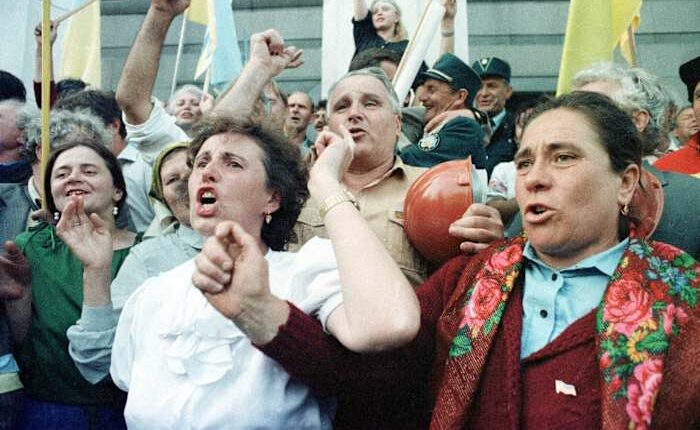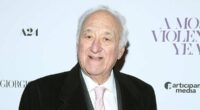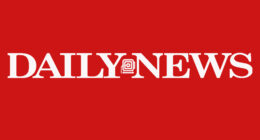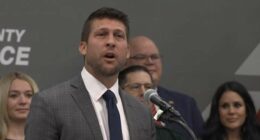Share this @internewscast.com

KYIV – Oleksandr Donii was a leader in the 1990 student-led protests advocating for Ukraine’s sovereignty and political reform, anticipating a long struggle for autonomy.
Contrary to his expectations, independence arrived swiftly. With the Soviet Union’s dissolution, Ukraine declared its independence in 1991, soon holding a referendum that garnered over 90% support from voters.
”I was preparing myself for prisons and labor camps, and I thought the struggle would last about 20–30 years,” Donii told The Associated Press.
Moscow’s grip endured after independence
On the 34th anniversary of this pivotal moment, Donii and Ukraine’s early lawmakers and activists recall how despite severing ties with the Soviet Union, Moscow’s influence persisted. Russia employed political pressure, social division, and marginalized pro-Western voices. These actions eventually set the stage for the full-scale invasion three decades later and Ukraine’s ongoing battle for autonomy and identity against its aggressive neighbor.
In 1990, Donii and fellow student strike leaders not only championed separation from Moscow but also sought to overhaul the political landscape at home.
Their initial goal was to hold immediate elections for Ukraine’s Parliament to replace Soviet-era legislators still in power. However, this proposal lacked widespread support, even among pro-independence groups.
“Ukraine, having won independence, did not win the removal of the Communist ruling class,” he said.
Donii believes that chances in the early 1990s were missed, leading to steep costs today as Ukraine strives for European Union and NATO membership, not as distant goals but as crucial steps for maintaining sovereignty and securing an independent future.
Oleksandr Nechyporenko, a lawmaker from the first Ukrainian Parliament, remembers how fragmented society was on the verge of independence.
“A very large part was neutral, it included people who wavered, who didn’t have enough information,” he recalled. “There was also a big and powerful core that was categorically in favor of preserving the Soviet Union, communist rule, ties with Russia, and so on.” Nechyporenko says the “passionate change-makers” were a minority.
‘We should have been more firm’
In his view, Ukraine’s tolerance toward agents of Russian influence since the early days of its independence was a major mistake. “We should have been more firm, more radical,” he said.
That sense of missed resolve is not limited to politics alone. Decisions made in the early years of independence continue to weigh heavily as Ukraine now fights for survival against Russia. One of the most consequential was the choice to surrender the vast nuclear arsenal left on Ukrainian soil after the Soviet collapse.
“The path we were supposed to take with the world’s third-largest nuclear arsenal — about five thousand nuclear warheads — that path should have given us the opportunity to effectively use this potential for integration with the West,” said Yurii Kostenko, a scholar and politician who led negotiations on Ukraine’s nuclear disarmament in the early 1990s.
He says that while leading the negotiation process, his vision of nuclear disarmament included the U.S. assisting Ukraine financially and technologically to turn nuclear warheads into fuel for nuclear power plants. Accession to NATO would have been Ukraine’s guarantee of security. The American side was ready to make it happen, Kostenko says.
A deal to give Russia its nuclear warheads
But instead of cooperation with the U.S., Kostenko recalls Ukraine being eventually pressured into surrendering its warheads to Russia, receiving almost nothing in return. He said to achieve that, then-Russian President Boris Yeltsin demanded Kostenko’s dismissal as leader of the negotiations by Ukraine’s then-President Leonid Kravchuk. That demand was granted.
No longer led by Kostenko, Ukraine’s delegation dropped the initial plan codesigned with the U.S. and chose to cooperate with Russia instead. Kostenko says that in exchange for its nukes, Ukraine received $1.5 billion in nuclear fuel and natural gas from Russia, which, he says, was worth around 1% of what Ukraine gave up.
Instead of NATO accession, Ukraine received the Budapest Memorandum, an agreement in which Ukraine was granted assurances of sovereignty and territorial integrity from the United States, the United Kingdom and Russia. For many Ukrainians, it has become a symbol of promises that carried no weight. Moscow shredded the agreement first with the annexation of Crimea in 2014 and then with the full-scale invasion in 2022. Three decades later, as Ukraine once again negotiates its future with Western partners under the shadow of Russian aggression, the choices and compromises of the 1990s still loom large, shaping its search for lasting security.
Copyright 2025 The Associated Press. All rights reserved. This material may not be published, broadcast, rewritten or redistributed without permission.












